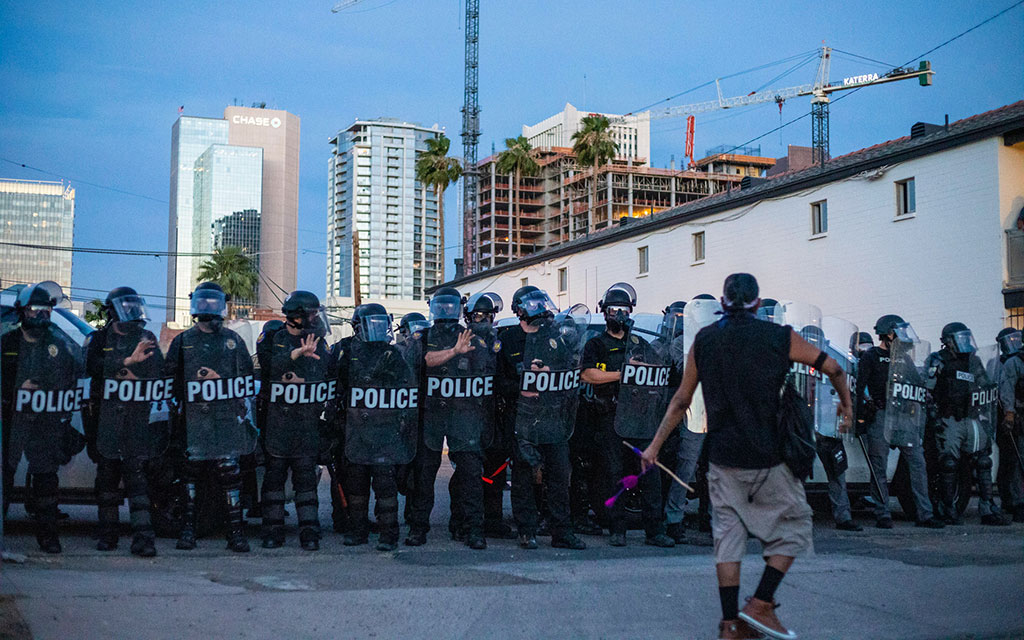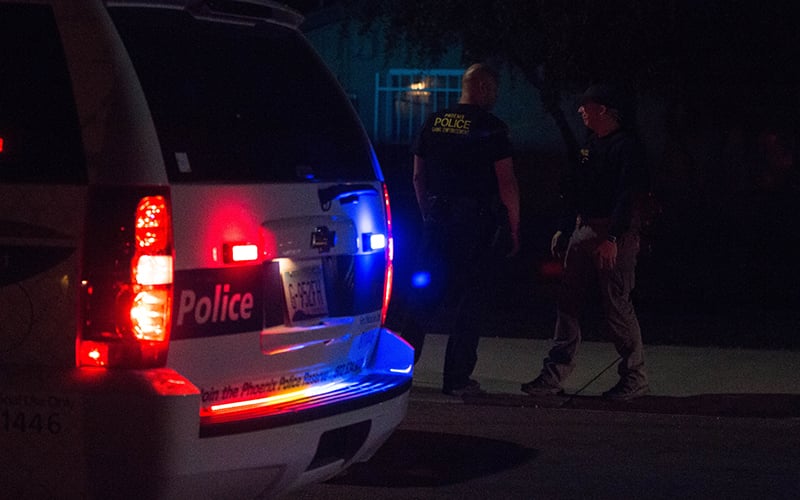
In this May 2020 file photo, Phoenix police officers confront a protester. Protests erupted across the country in 2020 over the death of George Floyd, a Black man, at the hands of a Minneapolis police officer. (File photo by Blake Benard/Special for Cronkite News)
The U.S. Department of Justice issued a report Thursday accusing the Phoenix Police Department of routinely using excessive force, including deadly force; violating the rights of lawful protesters; and targeting people of color.
The report comes after a nearly three-year investigation, which was initiated after a series of incidents raised questions about police conduct in Phoenix.
“Our findings today reveal very significant and severe violations of federal law and the Constitution,” said U.S. Assistant Attorney General Kristen Clarke, announcing the findings.
The Phoenix Police Department and city officials released a joint statement vowing to take a close look at the DOJ’s findings.
“We are taking all allegations seriously and are planning to review this lengthy report with an open mind,” City Manager Jeff Barton said in the statement.
Darrell Kriplean, the Phoenix Law Enforcement Association president, expressed frustration toward the DOJ for releasing its findings before decision makers in the department had time to review it, calling it an irresponsible “smear campaign against the men and women who have continued to courageously serve the community amidst dangerous inflammatory rhetoric by political activists and violent attacks from criminals.”
Kriplean said Phoenix police have already begun working on significant reforms without the DOJ’s interference.
“The Department of Justice is not interested in making local police departments and the communities they serve better. … They are only interested in removing control of local police from the communities that they serve through consent decrees that only enrich the monitors who are generally DOJ insiders,” Kriplean said.
During the duration of the DOJ’s investigation, Phoenix police have been adamantly against a consent decree, which is when the department agrees to oversight of various reforms and changes. The DOJ has not revealed yet if it will pursue a consent decree.
Joe Clure, Arizona Police Association executive director, shared a similar sentiment to Kriplean.
“We’ve seen this scenario come to life over the past years in Baltimore, Chicago, Albuquerque, Seattle and New Orleans, to name a few. All of these places are suffocating under the effects of counterproductive DOJ consent decrees,” Clure said.
“We stand with the Phoenix Law Enforcement Association and the thousands of Phoenix police officers who risk their lives every day to protect the Phoenix residents,” Clure continued.
In its documents, the Justice Department said it has found “reasonable cause” that Phoenix police have a pattern of conduct that violates citizens’ rights.
The DOJ found the department in violation of the First, Fourth and 14th amendments of the U.S. Constitution, along with the Safe Streets Act, The Civil Rights Act of 196 and the Americans with Disabilities Act.
These findings follow an investigation that began in August 2021, after a series of events came to light related to Phoenix police conduct, including an officer sweeping the legs of a man who was handcuffed and another officer pointing a gun at a pregnant woman and her children in the same incident. The death of Jacob Harris, a Black teenager who was shot in the back by a Phoenix officer, also raised alarm in 2019. The year prior, Phoenix had the highest number of fatal police shootings, 23, of any city in the country at that time, according to an analysis from the National Police Foundation.
In its 126-page report, the DOJ found that Phoenix police routinely engaged in a “pattern or practice” of unlawful conduct, including using excessive force; unjustified deadly force, violating the rights of lawful protesters; and targeting Black, Hispanic and Native American people.
“Police officers have an obligation to enforce the law fairly and equally, but in Phoenix, officers are disproportionately targeting communities of color,” Clarke said Thursday.
These findings were exemplified by statistics the DOJ provided upon its findings, such as Black drivers being 144% more likely than white drivers to be cited or arrested for low-level moving violations, and Hispanic drivers 40% more likely to be cited or arrested for low-level moving violations.
DOJ also found that Phoenix officers enforced drug and alcohol offenses more severely for minorities. Data DOJ collected showed that Native Americans were 44% more likely than white individuals to be cited or arrested for possessing or consuming alcoholic beverages.
The treatment of unhoused individuals by Phoenix Police was also another issue in the DOJ’s findings.
The DOJ found that 37% of all Phoenix misdemeanor arrests and citations involved people experiencing homelessness.
Clarke said that Phoenix police officers frequently stopped, detained and arrested unhoused individuals without reasonable suspicion that a crime had been committed.
“Our finding with respect to the treatment of people who are homeless is historic. This marks the first time that the Justice Department has found violations of the civil and constitutional rights of people who are homeless,” Clarke said.
Arizona had the fourth highest percentage of individuals experiencing homelessness in unsheltered locations, according to 2023 data from the U.S. Department of Housing and Urban Development. Maricopa County, where Phoenix resides, has the largest homeless population in the state, according to the Arizona Department of Economic Security.
The DOJ also found that both the city of Phoenix and its police department seized and destroyed property of unhoused people without providing adequate notice or fair opportunity for them to collect their belongings.
The issue was particularly problematic last year, when the city of Phoenix demolished and cleared a massive homeless encampment, dubbed “The Zone,” according to the DOJ.
“We know that the city closed The Zone and has found shelter for many of the people living there, but we nonetheless saw illegal stops, and property destruction continued outside The Zone. And we know that more will need to be done to ensure the police department changes its overall approach to policing homeless people – and to ensure respect for the rights of people who are unhoused throughout the city,” Clarke said.
“The criminalization of homelessness is not something that we can tolerate in our society today,” Clarke continued.
Clarke said the findings reveal a “longstanding dysfunction” that’s existed within Phoenix’s police department that reflect a lack of effective supervision, training and accountability of its officers.
“This is one instance where we can’t count on the police to police themselves,” Clarke said, acknowledging that, “while the city has undertaken some preliminary steps,” DOJ’s findings reveal severe violations that need to be fixed.
“We are prepared to do the hard work to address these reforms because the people of Phoenix deserve fair and non-discriminatory constitutional policing,” Clarke said.
Shortly after the DOJ released its findings, Mayor Kate Gallego released a statement.
“At the same time as the public, the City of Phoenix received the federal government’s findings report. The City Council will meet this month—in Executive Session on June 25—to receive legal advice, better understand the report, and discuss next steps. I will carefully and thoroughly review the findings before making further comments,” wrote Gallego.

